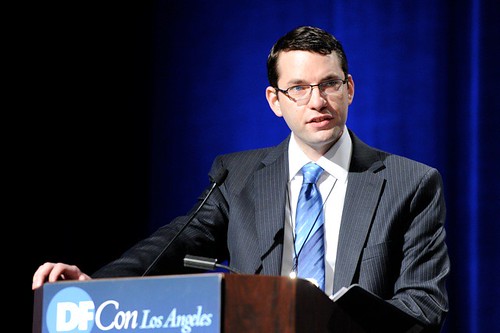Ventura County, California was long represented by useless back-bencher Elton Gallegly (R-CA-24). Now he’s retired, the lines have been redrawn to a slight Democratic advantage, and Democrats should have one of their best chances of picking up a House seat…unless vanity candidates, ostensibly Democrats, give the seat to the Republicans. The Democratic Congressional Campaign Committee lists the newly renumbered CA-26 as a “red to blue” race.
Below the fold, a case study in California’s new “top two” primary rules, and in ego.
On the Republican side, Tony Strickland is the young, energetic, ethically challenged teabagger into whom the national Republicans have poured their wealth ($250K and counting) and their hopes of winning this election and then cruising to reelection every two years for the next several decades. He’s running against Linda Parks, so moderate (think Olympia Snowe with environmentalist leanings) that she’s officially reregistered as “no party preference.” Both have high name recognition.
The Democrats began with county supervisor Steve Bennett as the front runner. Also filing were tennis pro David Cruz Thayne, harbor commissioner Jess Herrera, and Moorpark city councilmember David Pollock. Bennett withdrew literally minutes before an endorsement vote at the state Democratic party convention Feb. 11. Activists, including me, immediately began drafting Assemblymember Julia Brownley, and on Feb. 21 she stepped into the race, where she immediately became the front runner. However, unless the Democrats unify behind her, voters will diffuse their votes among four candidates and lose in a free-for-all, leaving Strickland to face Parks in the November election under California’s new “top two” rule.
Julia Brownley is both progressive and viable. She has a passion for education and a track record on environmental issues (she wrote AB 1998, the ban on single-use plastic bags, that nearly passed last year). She’s a coauthor of SB810, the California single-payer healthcare bill, and supports the California DISCLOSE Act requiring disclosure of money in politics. In her first ten days in the race, she’s raised over $150,000.
Who is David Cruz Thayne? He’s hired high profile consultants, including Garry South and Joe Trippi. He was chief of staff for the (Democratic) minority leader in the Utah state legislature, but apparently never run for office before. Fresh faces are welcome, but he hasn’t demonstrated strength as a candidate.
Cruz Thayne’s fundraising has been both anemic and questionable. In six months, he’s raised about $65,000, possibly as much as he’s spent on his expensive consultants. Review of FEC and Open Secrets records show that $5,000 came from Joe Hess, chief executive officer of Hess Oil Co., and his wife. Republicans are constantly floating proposals to get to local offshore oil, and environmentalists must constantly oppose their efforts; the last thing the area needs is to be represented by a Congressman friendly to Big Oil. Most of the rest came from friends-and-family in Utah and Malibu. He has no ActBlue support at all.
Cruz Thayne doesn’t appear to be knowledgeable on issues. I asked him the same question I ask all candidates – “I’m a single issue voter on climate. Give me your elevator pitch on why I should vote for you.” He told me that he drives a biodiesel car, which is nice but doesn’t demonstrate a grasp of policy. At a local debate, he was unfamiliar with DOMA, let alone why repealing it should be a Democratic priority.
Local activists call Cruz Thayne an empty suit. He’s acquired a handful of endorsements by Latino legislators outside the district, but no local endorsements at all. He’s not taken seriously. He’s simply a vanity candidate.
Jess Herrera is equally unimpressive. His website doesn’t mention his party affiliation, but does recite that he’s
* Right for Ventura County
* Right for America
* Right on the Issues
Again, he’s been endorsed by a handful of Latino legislators – Joe Baca, Cruz Bustamante, Gil Cedillo, and Lou Correa (but, oddly, no local politicians). And, as the repeated emphasis on being “right” hints, Herrera has a history of Republican endorsements. He’s been endorsed by District Attorney Greg Totten in the past. More troubling, in 2010 he was one of the few county elected officials to endorse Don Facciano in a treasurer’s race, an extremist so far to the right that his conservative opponent picked up endorsements across the political spectrum. And Facciano is now returning the favor, appearing at a fundraiser for Herrera.
Herrera’s fundraising is rumored to be weak; his ActBlue page currently shows a total of two donations. In short, he’s, at best, a vanity candidate.
David Pollock is a Moorpark city councilmember. He’s generally seen as progressive, and has gotten some buzz on a shoestring budget. I’d like to see him run for higher office, e.g., county supervisor or Assembly. However, it’s a big leap from councilmember of a relatively small city to Congress, his fundraising hasn’t impressed, he doesn’t have name recognition, and he’d be crushed by the Strickland juggernaut. His name on the ballot in addition to Brownley’s simply splits Democratic votes and increases the odds that neither will finish in the top two, leaving the November race between hard right Strickland and moderate Republican Parks.
A March 9 deadline looms. It’s time to ask Cruz Thayne, Herrera, and Pollock whether it’s more important that they have “failed candidate for Congress” on their resumes, enabling a Strickland-Parks election, or whether they will unify behind Julia Brownley so that the best Democrat can win the primary, win in November, and return Nancy Pelosi as Speaker of the House.
full disclosure: I’m an elected state Democratic Party delegate from AD-41, Brownley’s current district, although I only met her for the first time last Thursday. At the state party convention, I voted “no endorsement” after Bennett dropped out.
 Crowded Field and Top-2 could net interesting election
Crowded Field and Top-2 could net interesting election




